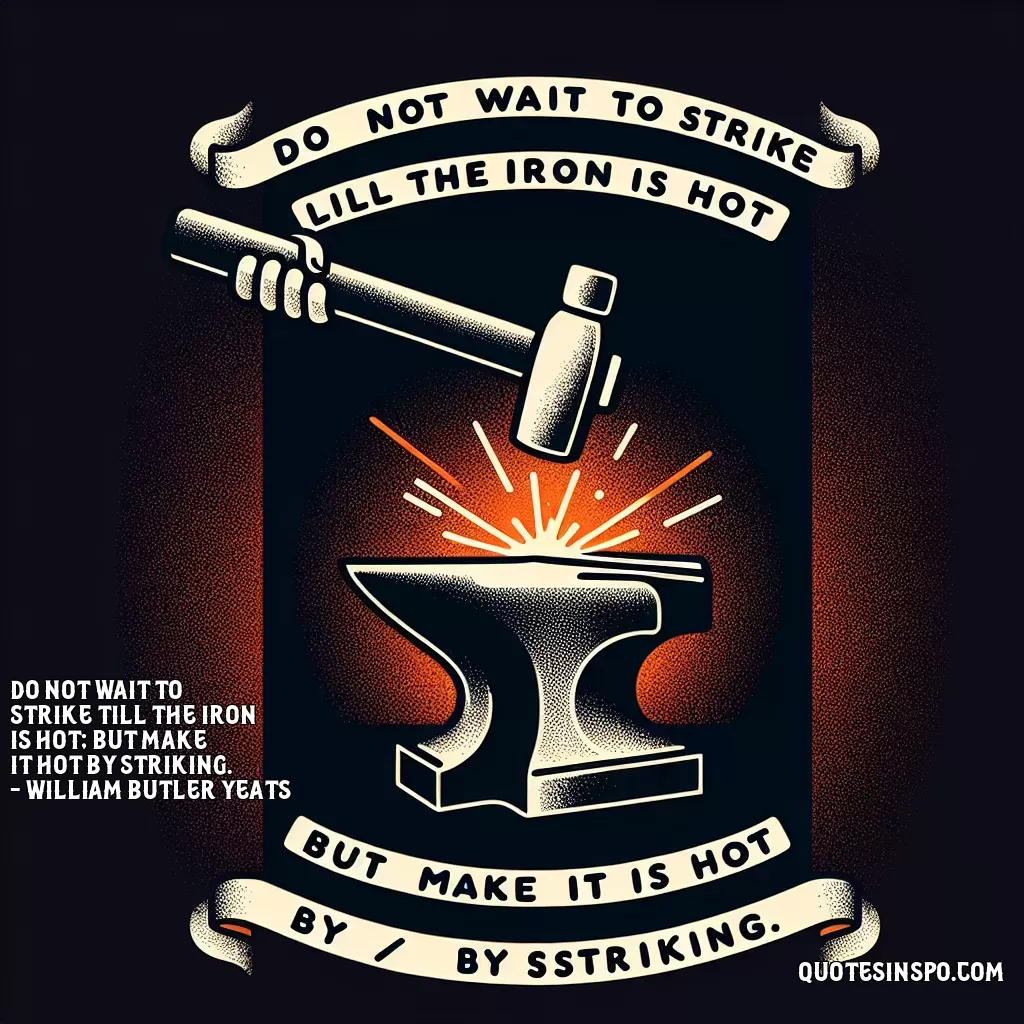
Do not wait to strike till the iron is hot; but make it hot by striking. - William Butler Yeats

Do not wait to strike till the iron is hot; but make it hot by striking. - William Butler Yeats
William Butler Yeats’ quote, “Do not wait to strike till the iron is hot; but make it hot by striking,” encapsulates a proactive approach to life and ambition. It suggests that one should not simply wait for the right moment or circumstance to take action. Instead, we should actively create our own opportunities through effort, determination, and initiative. Yeats implies that waiting for perfect conditions can lead to missed opportunities and stagnation. The metaphor of “striking the iron” illustrates the importance of hard work and persistence. In blacksmithing, an iron object must be struck repeatedly to become malleable and shaped into something useful or beautiful. Similarly, in life, success often requires consistent effort. By engaging with our goals, we generate energy and momentum, which can turn potential into reality. This quote also reflects a mindset of ownership over one’s destiny. By taking action, we exert influence over our circumstances rather than passively hoping for favorable conditions. It encourages a sense of empowerment; we can shape our future through our choices. In essence, Yeats advocates for the idea that opportunities are not always found—they are created through our actions and resolve. By embracing this philosophy, we can foster a more dynamic and fulfilling approach to achieving our aspirations. Ultimately, it serves as a reminder that while timing can be important, it is often our own efforts that catalyze change and enable progress.
Quote By: William Butler Yeats
William Butler Yeats, born on June 13, 1865, in Sandymount, Dublin, was an Irish poet, dramatist, and one of the foremost figures of 20th-century literature. His legacy as a foundational figure in modern poetry is illuminated through his mastery of both traditional forms and innovative styles. Yeats was born into a family steeped in artistic traditions; his father, John Butler Yeats, was a painter, and his mother, Susan Pollexfen, nurtured his interest in Irish folklore and mythology.
Yeats's literary career began in the late 19th century when he became involved in the Irish Literary Revival, a movement aimed at promoting Irish culture and heritage. His early work, influenced by Romanticism, focused on themes of beauty, love, and loss, often drawing on Celtic mythology. Notable works from this period include "The Wanderings of Oisin" and "The Wind Among the Reeds," which showcase his fascination with otherworldly elements.
As Yeats matured, his poetry evolved, reflecting his political and philosophical concerns. He became increasingly involved in Irish nationalism and the theatre, co-founding the Abbey Theatre in 1904, which became a crucial platform for Irish playwrights. Yeats's later poetry, often characterized by a more modernist approach, delved into complex themes of identity, aging, and spiritual quest. Collections such as "The Tower" and "Last Poems" are testaments to his profound introspection and mastery of language.
In 1923, William Butler Yeats was awarded the Nobel Prize in Literature, a recognition of his powerful contributions to poetry. His influence extended beyond poetry into other spheres, shaping modern literature's trajectory. Yeats passed away on January 28, 1939, but his work continues to resonate, inspiring countless writers and artists. Through his exploration of the spiritual and political dimensions of life, William Butler Yeats remains a towering figure in the literary world, celebrated for his profound insights and artistic brilliance.